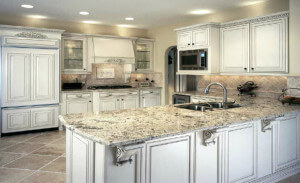Cabinet and Countertop Maintenance Guide
How to Care for Wood Cabinets
Caring for your wood cabinetry will be much like caring for any fine furniture. To care for it, you should dampen a soft cotton cloth with warm water. While that is usually sufficient to clean your cabinets, if more thorough cleaning is required, you should use a fresh solution of mild hand dishwashing liquid mixed with warm water. Make sure that every time you clean your cabinets, you wipe all surfaces with a clean soft cloth.
Tips for Cabinet Care
The first 30 days after you refinish your cabinets the finish/top coats will begin to “cure.” During the curing period, do not attempt to clean the cabinetry. If you clean them during the curing period you may permanently mar or damage the surface.
Splatters and spills should be cleaned immediately. Prolonged exposure to spills—including but not limited to: foods, liquids, oil or grease splatters—can cause permanent discoloration or damage your cabinet’s finish.
Extra care is required when cleaning glass inserts. Etching technology allows our glass inserts to be easily cleaned. Use warm, soapy water or standard mild glass cleaner. Do not apply directly to glass as it could seep behind the dividers and cause damage. Instead, spray onto a clean, soft, lint free cloth or paper towel.
Never use abrasives such as sponges, wire pads, or dishcloths, or ammonia, bleach, silicone or solvent based cleaners of any kind on your cabinetry. Avoid using any waxes, polishes, or dusting agents on the finish as over time the compounds inside these items may build up on the surface of your cabinets and cause a hazy, streaky or yellowed appearance. This build up is very difficult to remove.
Cabinets and Direct Sunlight
The natural pigments that are in every wood may cause them to “age” or appear different over time. Direct sunlight will often expedite this “aging” process in your cabinets. Try to keep windows shaded so the sun does not directly shine on your cabinets. The areas that are exposed to direct sunlight may need more care and maintenance to retain the luster and beauty of your cabinets.
How to Care for Thermofoil and Duralam Cabinets
Caring for your laminate cabinets requires the use of non-abrasive cleaners.
We recommend cleaning doors with a dishcloth and a solution of mild dish washing detergent and water. You may also use a mild cleaner such as Simple Green or similar product to clean the cabinets.
Never use solvents, thinners, or any cleaners containing ammonia, bleach, acetone, or abrasives on your cabinets. Using those products can cause de-lamination and will void your warranty. Avoid exposure to excessive heat or steam as this may cause delamination of doors and/or panels.
How to Care for Cambria Quartz Countertops
Maintaining Cambria is easy. Simply wash with a soft cotton cloth and warm water, use a mild soap if desired.
Never expose—in use or otherwise—Cambria to abrasive or strong alkaline or acid or free radicals or oxidizers or the like—whether high, neutral, or low pH—cleaners. Various chemicals are corrosive and/or erosive in their ability to attack any structure including Cambria. Be very aware of these potential damages to your surface.
Cambria is not heat proof, chemical proof, or fracture proof in any form. Be aware of damaging exposure to these potential damaging acts upon your Cambria.
Never use or expose Cambria to such products including, but not limited to:
- Bleach
- Oven cleaners
- Comet
- Soft Scrub
- SOS
- Products with pumice
- Batteries
- Paint removers
- Furniture strippers
- Tarnish or silver cleaners
- Abrasive or harsh scrub pads
- Sealers
- Penetrants
- Topical treatments
- Or similar substances
Such products will wear off and cause the gloss to appear dull or inconsistent.
How to Care for Granite Countertops from A&M Marble
Natural stone is porous and absorbs viscous liquids, which may leave a stain. Your countertop will be sealed upon completion of installation. Sealing the stone will retard the penetration of liquids. This will also provide time for you to clean your counters without staining. You should take preventive measures to ensure the beauty of your stone does not diminish. Granite requires sealing approximately every six months.
You may clean your stone by using dish soap or marble cleaner.
Never use Clorox, Windex, or other cleaning solutions which contain acidic products.



